RWE breaks ground on second solar farm in Ohio | Projects Weekly

RWE is building a 98 MWac solar project in Licking County, Ohio. Summit Ridge has energized a 4.1 MW solar installation in Rockingham County, Virginia. Equipment manufacturer Yanmar America installed solar to power its headquarters in Adairsville, Georgia. Read all about these solar installations and more in this edition of Projects Weekly.
Onsite construction is underway on RWE’s second solar farm in Ohio. The company acquired the 98 MWac Union Ridge Solar project in Licking County, Ohio, from Leeward Renewable Energy (LRE) in the fall of 2024.
RWE and construction partner MasTec Renewables aim to leverage Ohio’s strong craft union workforce for the construction phase of the project. The companies are collaborating with the Laborers’ International Union of North America, International Union of Operating Engineers and International Brotherhood of Electrical Workers local halls in Licking County and across the state to hire skilled union laborers, operators and electricians to construct this utility-scale solar project.
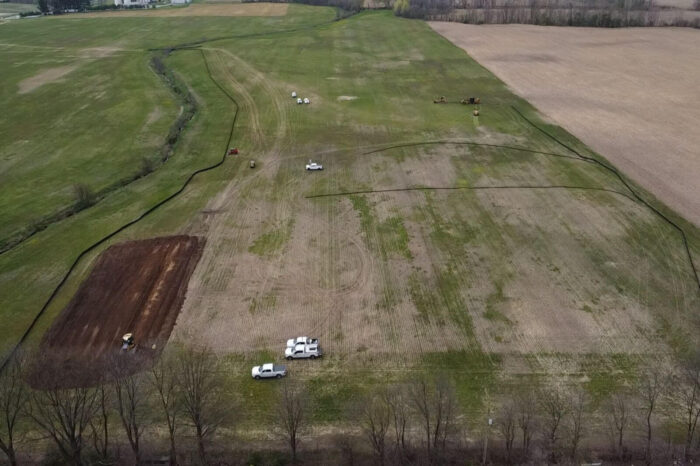
Cool factor: RWE’s investment in Union Ridge during the project’s construction phase will produce an estimated $68 million in new local economic activity for Licking County. This includes the direct employment of about 280 workers onsite at peak construction and associated wages and benefits, as well as increased purchases of local goods and services and local sales tax payments. The project also will provide more than $35 million in tax revenue over its 40-year lifespan to support the Southwest Licking Local School District, Harrison Township and other jurisdictions in Licking County.
Additionally, RWE is continuing LRE’s partnership with the Career and Technology Education Centers of Licking County (C-TEC) Postsecondary Education Center to help build Ohio’s future energy workforce through the support of a joint educational and career training program. The Solar Energy Training Course trains students in the assembly, mounting and maintenance of solar arrays used on utility-scale solar facilities in Ohio.
Summit Ridge energizes 4.1 MW Scenic Farms solar installation in Virginia
Summit Ridge Energy (SRE) has flipped the switch on its Scenic Farms Shared Solar Project, a 4.1 MW solar installation in Rockingham County, Virginia. The project is part of the state’s expanded Shared Solar program, which provides Dominion Energy Virginia customers with broader access to solar energy bill credits.
State officials, including Deputy Secretary of Commerce & Trade Maggie Beal and House of Delegates Majority Leader Charniele Herring, joined Summit Ridge leadership, key investors, and community partners to mark the official opening of the site.
“As Virginia has expanded its Shared Solar policy, we’ve had the opportunity to scale our efforts in tandem, now owning and operating 100 MW of projects across the state,” said Steve Raeder, CEO at Summit Ridge. “We’re committed to supplying locally generated power to Virginians while continuing our investment in the state.”
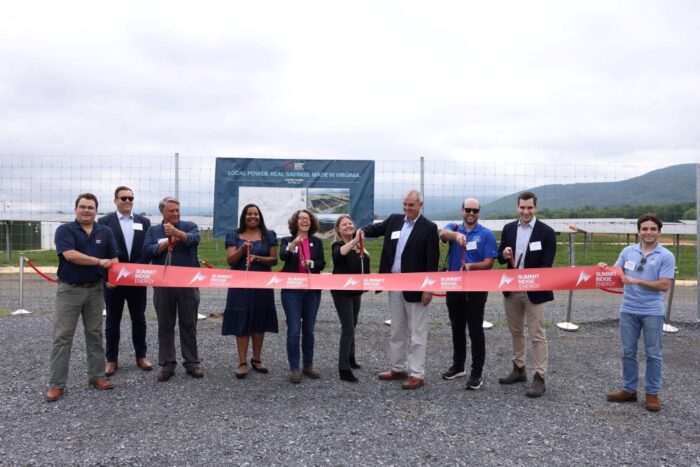
Cool factor: The construction and operation of this project and others in development represent Summit Ridge’s $250 million investment in Virginia, providing more than 1,000 jobs for construction workers, vendors, and local businesses. That investment is supported by Summit Ridge’s joint venture with Osaka Gas USA Corporation, with construction financing led by MUFG, a leading global financial group.
“It means a lot to know that this land is continuing to support our community, not only by producing food, but also by generating local energy,” said Leroy Heatwole of Scenic L Farms, the landowner where the solar facility is located. “We’re proud to still be raising poultry and growing wheat here, while also supporting the local education system and contributing to energy savings and economic growth. It’s an honor to be part of something that gives back and builds a legacy for my children and grandchildren.”
Once operational, the Scenic Farms site alone is expected to generate over 6.5 million kWh annually, delivering meaningful energy savings to over 600 local subscribers. Summit Ridge’s fleet of assets will reduce energy costs for nearly 16,000 Virginia households once energized. Residential customers located within Dominion Energy service territory will be able to subscribe and benefit from this project with bill credits beginning in the summer of 2025.
Baltimore solar project provides energy savings to LMI households
A $3.8 million, 808 kW rooftop community solar project in Baltimore, Maryland, is saving residents significant energy savings.
Earlier this year, the Climate Access Fund, Solar Stewards, CohnReznick, and additional partners “flipped the switch” to activate Solar4Us @ Henderson-Hopkins. The project is owned and developed by the Climate Access Fund and is located at Elmer A. Henderson: A Johns Hopkins Partnership School, a Baltimore City Public K-8 School.
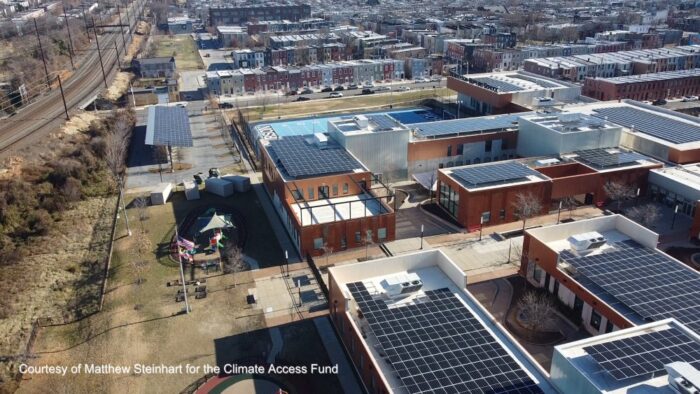
Cool factor: In addition to saving approximately 150 low- to moderate-income (LMI) households nearly $1 million in energy costs over 35 years and providing job training opportunities, Solar4Us @ Henderson-Hopkins amplifies practical ways companies can participate in the energy transition through Social RECs.
Through a unique arrangement established by Atlanta-based social enterprise Solar Stewards, job training and coursework at the school will be funded through professional services firm CohnReznick’s purchase of the Solar4Us @ Henderson-Hopkins’ Renewable Energy Credits (RECs), generating over a quarter of a million dollars in ongoing revenue for the Solar4Us @ Henderson-Hopkins project, the Climate Access Fund, and the organization’s future community solar objectives.
Yanmar America installs rooftop solar to power Georgia HQ
Yanmar America has taken a major step toward its sustainability goals with the installation of 914 high-efficiency solar panels at its headquarters in Adairsville, Georgia. As of March 25, the solar array is fully operational, following successful testing by Georgia Power. This solar array will reduce the facility’s reliance on non-renewable power sources and lower the company’s carbon footprint in line with the Yanmar Green Challenge 2050 goals.
“This solar investment is our first step toward reducing our carbon footprint,” said Yanmar America President, Jeff Albright. “Our commitment to the community and our employees is to be good stewards of the environment and leaders in achieving a zero-carbon footprint.”
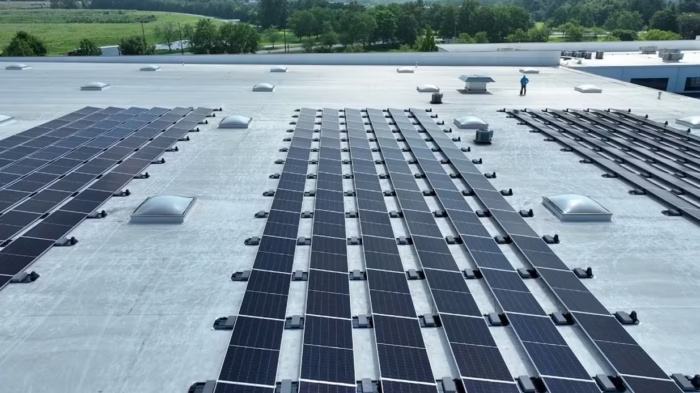
Cool factor: Sustainability has always been a cornerstone of Yanmar’s mission. For over a century, the company has developed innovative technologies to maximize efficiency while minimizing waste. This commitment extends beyond individual products and services to encompass Yanmar’s broader vision for a sustainable future. To meet the challenges of becoming an ecological footprint-free, GHG-free corporation based on recycled resources, Yanmar has launched the Green Challenge 2050.
The solar panel installation in Adairsville is just one example of Yanmar’s broader commitment to renewable energy. Similar initiatives are underway at other Yanmar facilities worldwide, including Yanmar Engine Manufacturing India, Yanmar Compact Equipment Europe, and Yanmar Europe, the Group’s European headquarters. Each installation plays a vital role in decarbonizing Yanmar’s operations while showcasing the scalability of renewable energy solutions across industries and regions.
HVAC solutions provider powers North American HQ with solar
HVAC solutions provider Daikin has completed a nearly 1 MW solar power plant at the company’s North American headquarters near Waller, Texas.
“Daikin’s unwavering commitment to innovation drives us to continually perfect the air we share. With the launch of this solar project, we’re one step closer to being a NetZero CO2 emission factory by 2030,” said Nathan Walker, senior VP of environmental business development, at Daikin Comfort Technologies North America Inc. “This installation is a significant step in reducing our carbon footprint and underscores our commitment to energy efficiency, sustainability and environmental stewardship.”
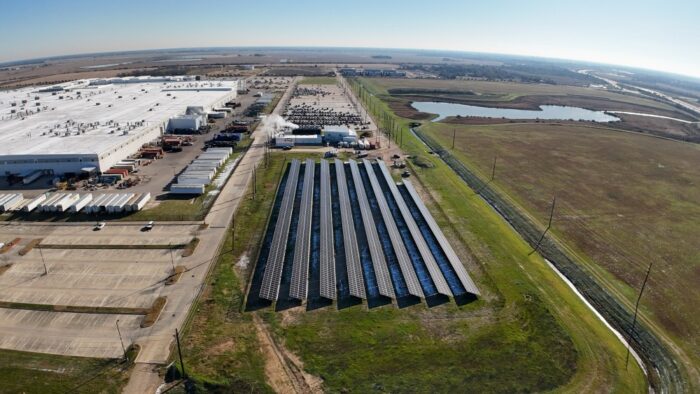
Cool factor: This installation at the Daikin Texas Technology Park (DTTP) features bifacial solar panels, designed to capture sunlight from both the front and rear sides utilizing direct and reflected ambient sunlight. The solar energy generated from the panels will directly power DTTP’s central chiller plant, which circulates approximately 125,000 gallons of chilled water annually and 75,000 gallons of hot water in the winter months, serving as a backbone for DTTP’s climate control. The solar structure is also designed for grid integration, allowing Daikin to support the wider power grid as needed. These efforts support Daikin’s goal to lower greenhouse gas emissions and advance environmental responsibility by 2030.
“This milestone represents Daikin’s long-term commitment to reaching our sustainability goals and we will use the learnings and foundations of this investment to continue to build a more energy-efficient and climate-conscious future across all of Daikin’s operations.” said Kurt Heim, Vice President of Environmental Advancement at Daikin.
Colorado State to add 5.75 MWdc virtual net metering solar project
Colorado State University has signed a 20-year partnership with Pivot Energy to develop a new 5.75 MWdc virtual net metering solar energy project. This collaboration reinforces Pivot’s role as a renewable energy partner to three large, leading Colorado universities, including the University of Colorado in Boulder and the University of Denver. Construction is expected to begin next winter and be completed during the fourth quarter of 2026.
“When this project is completed and begins delivering renewable electricity, CSU will be 11 million kWh a year closer to our 100% renewable electricity goal, at no net cost to the university,” said campus energy coordinator Stacey Baumgarn.
Cool factor: Through the partnership, Pivot Energy will build a ground-mounted solar project in Weld County, Colorado. The electricity produced will be transmitted directly to the Xcel Energy electric grid, which serves much of Colorado. All of the Renewable Energy Credits (RECs) will be transferred to CSU without increasing its electricity costs, representing a major step toward achieving the university’s sustainability goals.
CSU is taking advantage of virtual net metering, an innovative program made possible by Colorado Senate Bill 21-261, which passed in 2021. The legislation enables organizations to benefit from energy produced by offsite solar installations. Under the 20-year subscription agreement, CSU will utilize renewable electricity generated by the virtual net-metering solar project that Pivot will develop, construct, own, and operate, without needing to install solar onsite.

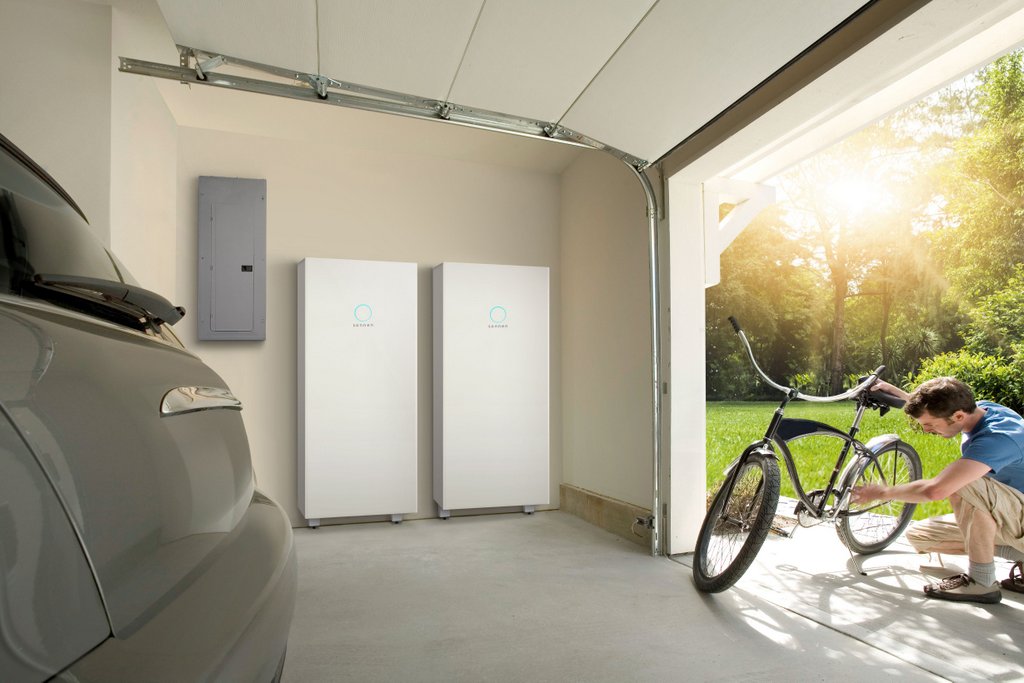



Comments are closed here.